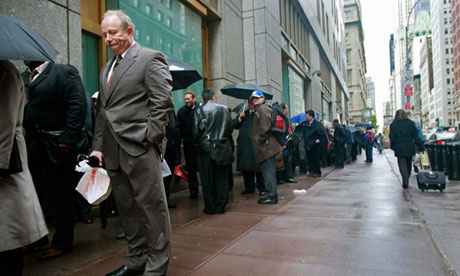Nowhere to hide: how a government default on its debt could affect you
Default would affect unemployment, stocks, Medicare and more. It may be time to channel your inner doomsday prepper

Government default would put more people out of jobs and make it harder for unemployed Americans to find work. Photograph: Mario Tama/Getty
The closer the debt ceiling deadline comes, the closer the doomsday prepper in all of us gets to the surface. The bad news is that the default will affect everyone. The worse news is that there's not much to do to prepare for this scenario.
If the government defaults, it doesn't just hurt banks and people holding Treasury bonds. The US government makes about 80m separate payments each month, many owed directly to the American people. Among them are payments for social security, Medicare, Medicaid, military salaries, veterans' benefits, income tax refunds, food stamps, unemployment insurance, and government contracts with small and large businesses.
If the US defaults, there is a risk that people who depend on the government for their income will be unable to eat or pay bills for other basic necessities. There are over 4 million people claiming unemployment benefits every week, according to the most recent Department of Labor release. Many people are already suffering becasue of the $2.4bn cut in emergency unemployment benefits that took place in March.
Also affected by the default will be the 47 million people on food stampswho won't be able to go to the store and purchase food. Government contractors may be unable to make payroll, leaving their employees scrambling to pay bills. Some furloughed workers are already applying for unemployment insurance.
You don't have to accept government assistance to feel the pain of a default, however.
If the US defaults on its debt, the interest on US treasuries will increase, causing interest rates on all kinds of loans – home, car, small business – to go up as well.
To put it simply, with higher interest loans, consumers might be dissuaded from purchasing a new car or a home. If small business can't get a loan, they won't grow and create jobs. Unemployment would likely rise.
If you have money in the stock market, a default could also be disastrous. If President Obama and Congress cannot reach a deal in a timely manner, all those Americans who have been diligently paying money into their 401k could see portions of their retirement funds disappear.
The IMF warned this week that if central banks do as little as diminish stimulus, it could result in a loss of $2.3tn to world markets. It would be much, much worse for a default, which would set off a crisis.
The last time lawmakers played a game of chicken over the debt ceiling in 2011, the Dow Jones lost about 2,000 points in the aftermath. The steep decline was due to the fact that in August 2011 Standard & Poor's lowered America's credit rating from AAA to AA+. While US creditworthiness could remain intact this time around, according to Moody's, the stock market could still take a hit.
Some have recommended that the Treasury prioritize what bills to pay once the debt limit is breached, but the current secretary, Jack Lew, dismissed that suggestion, saying, "Prioritization is just a default by another name."
"How can the US choose to send Social Security checks to seniors or pay benefits to our veterans? How can the US choose whether to provide children with food assistance or meet our obligations to Medicare providers?" Lew said Thursday.
The worst part is, there's nowhere to hide. Yes, banks are putting more cash in their ATMs, but a default would cause such panic that there would be no way to get through the lines of people to get that cash. You'd need food, water, money, all at home: that's the kind of catastrophe that would result.
No comments:
Post a Comment